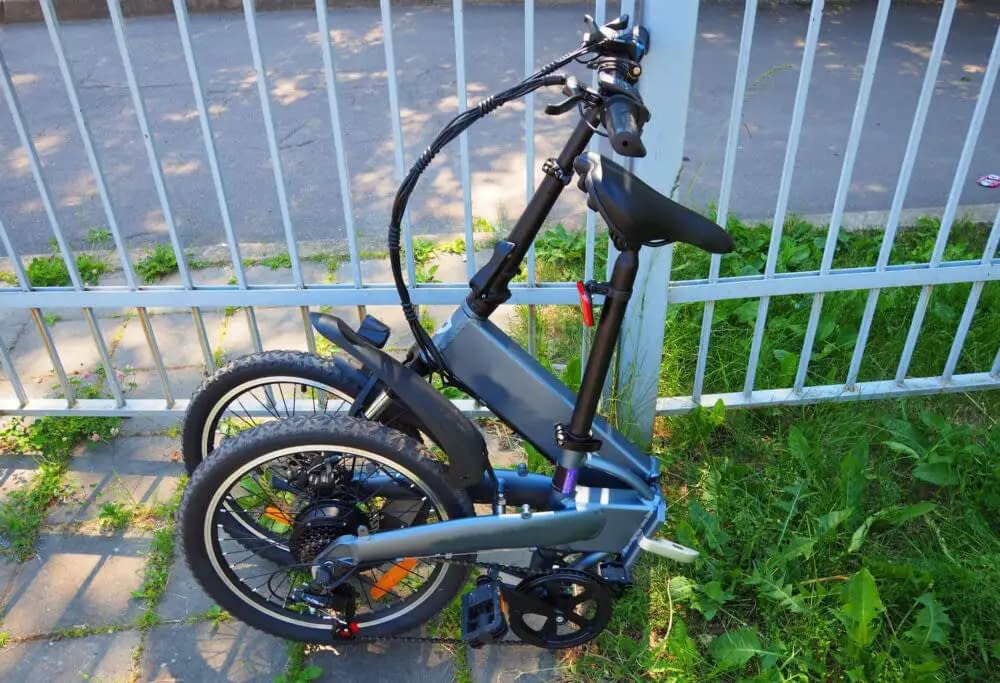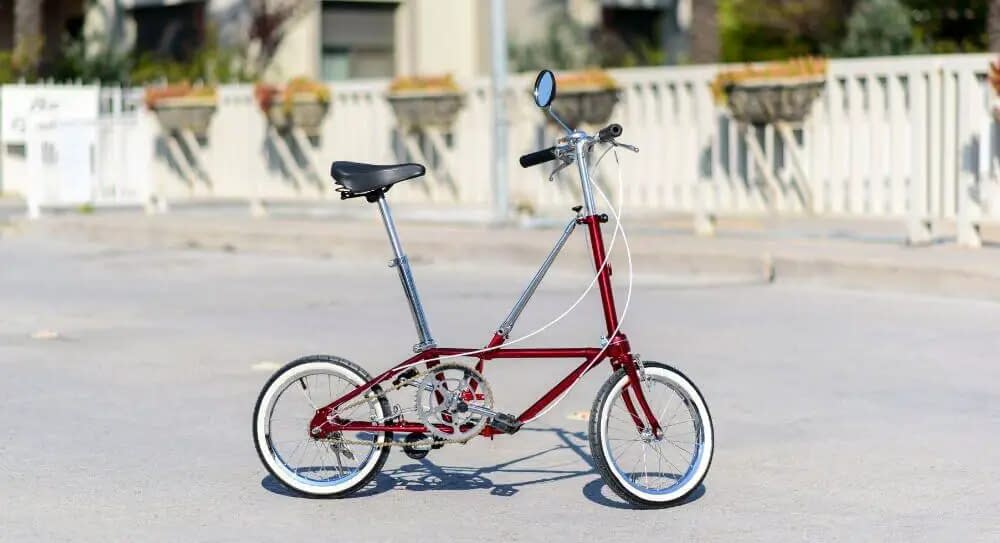We may earn a small commission on purchases made through our links, at no extra cost to you. Thank you for your support!
Folding bikes have become increasingly popular as a convenient and versatile mode of transportation. However, many people have a question: are Folding Bikes Safe? This article will comprehensively analyze the safety features and benefits of folding bikes to determine their safety. We will explore the different safety features that are unique to folding bikes and discuss the benefits they offer to riders. By the end of this post, you will be fully informed about the safety features of folding bikes.
Safety Features of Folding Bikes
A variety of safety elements are built into contemporary folding bikes to provide a stable and safe riding experience. Many models include advanced locking mechanisms that keep the bike securely folded while riding, preventing unexpected collapses. Some of these features include strong and durable frames that provide stability and support, reliable braking systems for efficient stopping power, and adjustable seat and handlebar heights for a comfortable and customizable riding experience.
Many folding bikes come with built-in lights and reflectors for increased visibility and fenders to protect riders from water and mud splashes. These safety features ensure that riders can have a safe and enjoyable riding experience on their folding bikes. Furthermore, the compact size of folding bikes makes them easy to manoeuvre and store, reducing the risk of theft or damage. Overall, folding bikes have various safety features that make them a practical and secure transportation option for riders.
Today’s folding bikes are equipped with advanced safety features that prioritize rider security without compromising convenience or portability. As manufacturers continue to innovate in this rapidly growing segment of the cycling industry, we can expect even more sophisticated safety enhancements to further solidify the reputation of folding bikes as a safe transportation option for urban dwellers and outdoor enthusiasts alike.
Benefits of Using a Folding Bike
Folding bikes offer many benefits that make them useful and adaptable options for city commuters and avid cyclists alike. One major advantage is their compact size. This makes storage in small areas like apartments, offices, or public transportation simple. This lowers the possibility of theft or damage, offering peace of mind to riders. This makes them ideal for city dwellers who may not have ample storage space.
Additionally, folding bikes’ portability enables users to effortlessly take them indoors to guard against theft or adverse weather conditions. Moreover, their versatility means riders can seamlessly transition between cycling and walking, enhancing convenience in dense urban environments. Despite initial safety concerns, modern folding bikes meet rigorous industry standards and are engineered with robust materials to ensure a secure ride. Therefore, potential buyers can confidently consider these convenient two-wheelers without compromising safety.
Tips for Safe Riding with a Folding Bike
Here are some tips for safe riding with a folding bike:
- Check the folding mechanism: Before riding, always ensure that the folding mechanism of your bike is secure and properly locked in place. This will shield riders from accidents or injuries while riding.
- Wear a helmet: Just like with any other bike, wearing a helmet is essential for safety. Make sure to wear a properly fitted helmet to protect your head in case of a fall or collision.
- Check the brakes: Regularly check and maintain your bike’s brakes to ensure they are in good working condition.
- Stay visible: Use lights, reflectors, and bright clothing to make yourself visible to other road users, especially when riding in low-light conditions or at night.
- Follow traffic rules: Obey traffic laws and signals, and ride in the designated bike lanes or paths to ensure your safety and the safety of others on the road.
- Practice safe folding and unfolding: When folding and unfolding your bike, be mindful of your fingers and ensure that the process is done safely to avoid injuries.
- Avoid overloading: Be mindful of your folding bike’s weight limits and avoid overloading it with heavy items or luggage to prevent damage to the bike and potential accidents.
Folding Bikes Pros and Cons

Pros
On the positive side, they are incredibly convenient for commuters in cities because they are easily folded and stored in small spaces. This makes them an excellent choice for those who live in apartments or don’t have a lot of storage space. Additionally, they are easy to transport on public transportation and can be taken inside buildings, reducing the theft risk.
Cons
There are some drawbacks to consider. Folding bikes tend to be less efficient and comfortable than traditional bikes. The smaller wheels and frame can bump the ride, and the folding mechanisms add extra weight. Additionally, folding bikes can be more expensive than traditional bikes due to the advanced engineering and materials required for the folding mechanisms.
Comparison of Folding Bikes to Traditional Bikes
When it comes to comparing folding bikes to traditional bikes, folding bikes are as safe as their traditional counterparts. The truth is, when properly maintained and used according to manufacturer guidelines, folding bikes can be just as safe as traditional bikes. Some folding bike models come with advanced safety features such as disc brakes and sturdy frame designs, making them reliable and secure for everyday use.
A major advantage of folding bikes is their versatility in urban environments. With their ability to fold up for easy storage in small apartments or offices, folding bikes offer a level of convenience that traditional bicycles simply cannot match. Additionally, the portability of folding bikes makes them an excellent choice for commuters who need to combine cycling with public transportation. While traditional bikes offer a classic riding experience and better performance over long distances, the compact nature of folding bikes offers unique practicality without sacrificing safety or comfort.
Addressing Common Concerns and Misconceptions

One common concern about folding bikes is their stability and durability. Many people worry that the folding mechanism may compromise the bike’s structural integrity, leading to safety issues. However, it’s important to note that modern folding bikes are designed with high-quality materials and advanced engineering to ensure stability and safety. The folding mechanism is rigorously tested to meet safety standards and withstand daily use’s rigours.
Another misconception is that folding bikes are less safe than traditional bikes. In reality, folding bikes have many of the same safety features as traditional bikes, such as reliable brakes, sturdy frames, and efficient gearing systems. Additionally, some folding bikes come with integrated safety measures, such as built-in lights and reflective elements for increased visibility, making them just as safe as traditional bikes.
Conclusion: Are Folding Bikes Safe?
When used properly, folding bikes are safe and reliable modes of transportation. With their advanced safety features, durability, and numerous benefits, folding bikes provide riders a secure and convenient cycling experience. By addressing common concerns and misconceptions, we can promote the use of folding bikes as a safe and sustainable transportation option.
FAQ
Are folding bikes safe to ride?
Yes, folding bikes are safe to ride when used properly and when they are well-maintained. It’s important to check the bike’s components regularly and ensure they are in good working condition.
Can folding bikes handle different terrains?
Many folding bikes are designed to handle various terrains, including city streets, bike paths, and even some off-road trails. Choosing a folding bike that suits your specific riding needs and preferences is essential.
Are folding bikes suitable for long-distance rides?
Folding bikes may not be the ideal choice for long-distance rides compared to traditional bicycles; many models are designed to provide a comfortable and efficient ride for moderate distances.
Can folding bikes go uphill?
Yes, folding bikes can go uphill, but it may be more challenging than regular bikes. This is because folding bikes typically have lower gear ratios and smaller wheels, which can make it harder to climb steep inclines.
Is it worth getting a foldable bike?
It depends on your specific needs. The major advantages of a folding bike are that it is perfect for commuting, combined with public transport, and storage in small spaces. However, it’s important to consider that folding bikes may not be ideal for long-distance cycling, competitive riding, or rough terrain. They may not offer the same level of performance and comfort as traditional bikes in these scenarios.
Are folding bikes heavier?
Yes, folding bikes are generally heavier than standard bikes because of the additional mechanisms they need to fold and unfold. However, a folding bike’s weight can vary greatly depending on the model and the materials used. Some folding bikes are designed to be lightweight for easier portability, while others may be heavier but offer added durability.
What are the disadvantages of a folding bike?
One potential downside is the cost; folding bikes can be more expensive than traditional bikes.
What’s the difference between a fat tire and a regular tire e-bike?
The main difference is the width of the tires. Fat tire e-bikes have wider tires, which provide more stability and traction, especially on rough terrain. Regular tire e-bikes have narrower tires, which are better suited for smoother surfaces and urban riding. For detailed information, check out this article – Fat Tire Vs Regular Tire Ebike.
